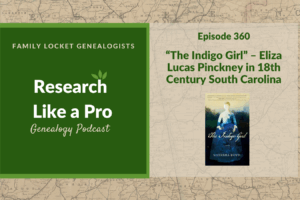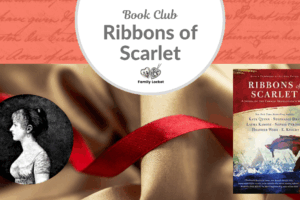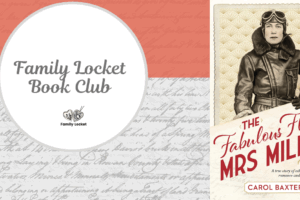Do you have a family story to tell? One that depicts a transformative era in an ancestor’s life or maybe a simple story of connection? You may be at a loss, not knowing where to begin. In Annette Gendler’s book, How to Write Compelling Stories from Family History, you will learn techniques to start you on the path of writing your own family stories.
We are reading How to Write Compelling Stories from Family History as our spring Family Locket Book Club selection on Goodreads. After reading various family history books, maybe it’s time to write something of our own! The book consists of several short chapters with compelling names such as “How Not to Be Boring” and “The Parking Lot Tool.” Each chapter contains a prompt to urge the reader to write. Examples throughout show the way and inspire.
Annette begins her book with the following message to the reader.
This book is meant to help you tackle the often overwhelming project of “doing something” with your family history; the stories you grew up with that no one wrote down (or maybe someone did), the piles of family documents, the boxes of letters and photos, a heap of genealogical research, or a relative’s handwritten memories. It could even be the history of another family you care about.
I reached out to Annette to discover more about her background in writing family history. Enjoy learning more about her journey. -Diana
Tell us about yourself.
 I am the author of the guide How to Write Compelling Stories from Family History as well as the memoir Jumping Over Shadows, the true story of a German-Jewish love that overcame the legacy of the Holocaust. Since 2006, I have been teaching memoir writing at StoryStudio Chicago. After Jumping Over Shadows came out in 2017, I began offering a workshop on shaping family history into interesting stories. I taught that workshop in many venues. It was always very popular, so I eventually turned it into a guide that could be more widely shared. I am passionate about helping others “do something” with their family history. I publish a newsletter (sign up here) with ideas and examples, and I also run an advice column on my blog.
I am the author of the guide How to Write Compelling Stories from Family History as well as the memoir Jumping Over Shadows, the true story of a German-Jewish love that overcame the legacy of the Holocaust. Since 2006, I have been teaching memoir writing at StoryStudio Chicago. After Jumping Over Shadows came out in 2017, I began offering a workshop on shaping family history into interesting stories. I taught that workshop in many venues. It was always very popular, so I eventually turned it into a guide that could be more widely shared. I am passionate about helping others “do something” with their family history. I publish a newsletter (sign up here) with ideas and examples, and I also run an advice column on my blog.
How did you get started in family history? Do you remember an initial “spark” or incident that inspired you?
In 2002, I traveled, for the first time, to my grandparents’ hometown in the Czech Republic. Even though I had never been there before, the town felt oddly familiar to me. I sensed so many undercurrents there and realized I had to dive into the family history to learn exactly how events there had unfolded. Thankfully, our grandfather had taken the time to write his memoirs, so all I had to do was ask my sister to dig them out of storage and start reading.
Those memoirs, however, did not contain anything about the most pivotal event in my grandparents’ lives, which forever changed the family’s trajectory, namely their expulsion from Czechoslovakia after World War II. My grandparents lost their home and their homeland. They became refugees in what would later become West Germany, and although they eventually adapted quite well to their new life, the family had been uprooted. My generation grew up without that sense of being from somewhere. My dad, their only surviving child, pursued a Ph.D. in the U.S. and married an American. My siblings and I grew up with two nationalities and two languages. Being displaced, in a sense, was normal to us. Only when I read my grandfather’s memoirs did I realize that he had had something I didn’t even know: a homeland.

Annette in front of her grandparent’s former house in Liberec, Czech Republic, in 2002.
Did you have any experiences as a child/teen in school or at home that helped you be more inclined toward family history?
Growing up, I was very close to my paternal grandmother, Oma. She was a gifted storyteller and shared many, many tales of her family, her childhood, and life in the “old country.” Thus the past was always quite present for me. When I wrote Jumping Over Shadows, I had to supplement a lot of that family lore with research and my grandfather’s writings to fill in the blanks and figure out the context.
What personality traits, hobbies, or professional pursuits have helped you in your genealogy research?
I have always been interested in history, and history told through a personal lens is just so much more compelling than that found in a history book. Filling in the historical context is a huge part of writing family history. Doing my research for Jumping Over Shadows, I often had to curtail myself as I got intrigued by a historical tangent that was super interesting to me but not necessarily relevant to the story. I loved that the research for my book got me to actually go into archives and read, for example, eyewitness accounts of the 1946 deportations or peruse newspapers from 1938, in which I found my great-grandfather’s death notice. It helped a lot that I am fluent in German. Thankfully, I can also read old German script, and that has helped me not only read newspapers from the 1920s and ‘30s but also decipher handwriting from back then.

My great-grandfather’s death notice from November 1938 does not mention his suicide.
Why do you do genealogy? Why do you think it’s important?
I have always been conscious of the presence of the past in our lives. What happened to our forebears and the choice they made influenced who we are. For example, an ancestor’s decision to emigrate from Ireland to the U.S. in the 1840s forever changed who that family would be. Furthermore, the memories we inherited that are not our own shape our lives because they shaped the people who raised us. The more we understand where those memories came from, the more meaning we find in our own lives.
What is the most rewarding part of researching your family’s history?
Putting it in order for the next generation to understand and transmit. Writing Jumping Over Shadows was my biggest success so far, but I have also written shorter stories capturing various family experiences and tales.
What has been the most difficult part of your genealogical journey?
Actually sitting down to do it. I have a hard time getting motivated to open Ancestry.com and actually input all the family tree data my aunt assembled. As long as there is no urgency behind that, I find it difficult to commit the time to do this. On the other hand, putting together the family tree of my father’s family for my book was easy because it was helpful in following the story. Wanting to tell a particular story of the past actually makes genealogical record-keeping happen for me.
How do you preserve your family history?
 I write memoirs. Jumping Over Shadows tells the true story of how the same impossible love between a Jewish man and a German woman happened twice in our family, in my great-aunt’s life, as well as in mine. Of course, there are large swaths of the family history that this book does not capture. For a story to work, you have to weed out a lot of material. Nevertheless, I am glad I told this history that had such a big impact on my life, and thus on my children’s lives, and that I told it from my point-of-view.
I write memoirs. Jumping Over Shadows tells the true story of how the same impossible love between a Jewish man and a German woman happened twice in our family, in my great-aunt’s life, as well as in mine. Of course, there are large swaths of the family history that this book does not capture. For a story to work, you have to weed out a lot of material. Nevertheless, I am glad I told this history that had such a big impact on my life, and thus on my children’s lives, and that I told it from my point-of-view.
What is your favorite way to share genealogy and family history with others?
Stories, and ideally, memoir! Storytelling is the most powerful and lasting way to transmit our family’s history from one generation to the next. Not all family history fits into a story, but stories are how we transmit history. Stories are retold again and again. When grandparents talk to their grandchildren about the family and the days of old, it won’t be in the form of a detailed family genealogy. Rather, they will choose a captivating story from their family history, one they remember well and share it with a rapt grandchild, who will keep asking, “and then what happened?” So, it is my mission to inspire as many people as possible to write down as many stories as possible from their family history, which is why I wrote How to Write Compelling Stories from Family History.
If you had all the time in the world to spend on family history, what would you do?
My maternal grandmother’s father abandoned his wife and five children in Indiana and disappeared. He was the black sheep of the family even before then. My aunt traced him to California, and supposedly, he started a new family there. It would be interesting to find them and fill out that story.
What’s the best discovery you’ve made about your family?
The father of my beloved grandmother committed suicide in 1938, shortly after the Nazis had taken control of their hometown. His death was always a family taboo; my grandmother never talked about it. Through my research, I stumbled upon a stunning reason for his suicide, which I reveal in Jumping Over Shadows.
Who is your most interesting ancestor?
My paternal grandfather, Emil Karl Berndt, is the person I would most want to meet in heaven. He is a protagonist in Jumping Over Shadows. My great-aunt’s story, which parallels and contrasts with mine, is told from his point-of-view. It is mainly based on his memoirs and letters. Writing the book, I spent a lot of time in his head, so I feel I know him. However, he died when I wasn’t even two years old. He loved me greatly as a baby, but I have no memory of him. I’d love to sit with him in one of those Austrian cafés he used to frequent—hopefully, they have those in heaven—and find out if I got him even remotely right.
Thanks, Annette, for sharing your thoughts with us!
















Leave a Reply
Thanks for the note!